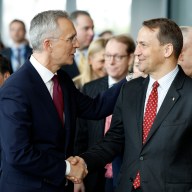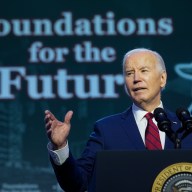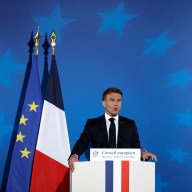OTTAWA – The Harper government says it’s going to unprecedented lengths to consult on the coming federal budget after suffering a near-death experience over its widely panned fiscal update.
Prime Minister Stephen Harper, his ministers and federal officials have been feverishly meeting with their provincial counterparts, opposition leaders, business leaders, aboriginal leaders and economists, with more meetings to come before the budget is released Jan. 27.
The consultations will culminate Jan. 16 when Harper is to spend the day meeting with premiers and territorial leaders. They are to discuss the budgetary measures needed to stimulate Canada’s faltering economy and insulate it from the worst of the global economic crisis.
The first ministers will focus particularly on the need for additional, multibillion-dollar investments in infrastructure projects, although a senior Tory official said no specific spending announcements are expected.
On the evening prior to the first ministers’ gathering, Harper and the premiers will meet for a few hours with aboriginal leaders to discuss the specific needs of one of Canada’s most disadvantaged communities.
“We’re going through what I think is an unprecedented consultation process, both in terms of the senior level it’s occurring at, the breadth and depth of that consultation and also the speed at which it’s being done,” the senior official in the Prime Minister’s Office said at a briefing Wednesday.
The official called the budget “one of the most important budgets in Canadian history, certainly the most important in recent Canadian history.”
The lengths to which the government is going to canvass opinion on what measures need to be in the budget are in stark contrast to last fall’s fiscal update.
The government did some relatively cursory consultation before unveiling the Nov. 27 statement. It was panned by economists for failing to offer any economic stimulus and for fudging the numbers in order to maintain the fiction that the country was not about to fall back into huge deficits.
And it enraged opposition parties by including several measures that appeared motivated solely by partisanship or conservative ideology – such as proposals to scrap the public subsidy for political parties, suspend public servants’ right to strike and do away with pay equity.
Harper backed off the most controversial measures once it became clear the three opposition parties were serious about defeating his minority government and trying to form an alternative coalition regime. He eventually prorogued Parliament rather than face a confidence vote in the House of Commons.
Parliament is to reopen Jan. 26 with another throne speech outlining the government’s agenda. Having signalled its priorities in a throne speech just two months ago, the official said the coming speech will be short and perfunctory, with the real, detailed agenda to be laid out in the budget the following day.
Newly minted Liberal Leader Michael Ignatieff has warned he’s prepared to pursue the coalition agreement with the NDP and Bloc Quebecois if he’s not satisfied with the budget.
Harper has already met once with Ignatieff and the official indicated that more consultations with opposition leaders are in store. He urged opposition parties to come up with specific proposals for restoring the country’s economic health.
“It’s hard to complain after the fact that you haven’t got what you wanted if you don’t tell us what you want.”
While the budget is traditionally always considered a matter of confidence, the official signalled that the government will no longer threaten to turn other matters into tests of confidence – a tactic it has employed successfully in the past to force through its agenda.
“We’re in a different situation. … We’re in a situation where we have a global economic crisis and where the expectation of Canadians is that the government and opposition parties will put their focus on addressing the economic crisis,” he said.
The official said the government “reserves the right” to determine what constitutes a confidence matter. But he indicated that the government’s fate is unlikely to turn on “secondary” matters not directly related to the economy.
















